Luckybug
On this page, you find all documents, package deals, and flashcards offered by seller Luckybug.
- 261
- 0
- 9
Community
- Followers
- Following
270 items
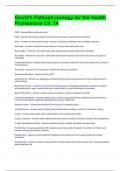
Gould's Pathophysiology for the Health Professions Ch. 14 Questions And Correctly Answered Graded A+
Gould's Pathophysiology for the Health Professions Ch. 14 CNS - Answer-Brain and spinal cord PNS - Answer-Cranial and spinal nerves, sensory neurons, neuromuscular junctions Brain - Answer-control center of body, receives, processes, evaluates info & initiates response Meninges - Answer-3 connective tissue layers covering brain and spinal cord Dura matter - Answer-Is the outermost tough double layered membrane of the meninges Pia matter - Answer-Is a very thin membrane that ad...
- Exam (elaborations)
- • 5 pages •
Gould's Pathophysiology for the Health Professions Ch. 14 CNS - Answer-Brain and spinal cord PNS - Answer-Cranial and spinal nerves, sensory neurons, neuromuscular junctions Brain - Answer-control center of body, receives, processes, evaluates info & initiates response Meninges - Answer-3 connective tissue layers covering brain and spinal cord Dura matter - Answer-Is the outermost tough double layered membrane of the meninges Pia matter - Answer-Is a very thin membrane that ad...
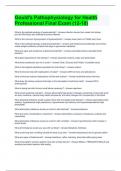
Gould's Pathophysiology for Health Professional Final Exam (12-18) Questions And Answers Certified Graded A+
Gould's Pathophysiology for Health Professional Final Exam (12-18) What is the pathophysiology of pyelonephritis? - Answer-infection travels from ureter into kidney; pus fills fills kidney and medulla becomes inflamed What is the common sign/symptom of pyelonephritis? - Answer-lower back or FLANK pain; fever What is the pathophysiology of glomerulonephritis? - Answer-anti-streptococcal antibodies are formed, create antigen-antibody complex that lodge in glomerular capillaries What ...
- Exam (elaborations)
- • 5 pages •
Gould's Pathophysiology for Health Professional Final Exam (12-18) What is the pathophysiology of pyelonephritis? - Answer-infection travels from ureter into kidney; pus fills fills kidney and medulla becomes inflamed What is the common sign/symptom of pyelonephritis? - Answer-lower back or FLANK pain; fever What is the pathophysiology of glomerulonephritis? - Answer-anti-streptococcal antibodies are formed, create antigen-antibody complex that lodge in glomerular capillaries What ...
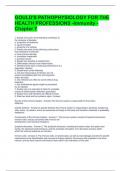
Pathophysiology For Health Professions - Chapter 1 Questions And Answers Graded A+
Pathophysiology For Health Professions - Chapter 1 Refers to a procedure by which a small amount of living tissue is removed by surgical procedures for the purpose of examining the removed tissue sample. - Answer-Biopsy Is the examination of the body after death. It involves both macroscopic and microscopic examination of organs and tissues, as well as the analysis of tissue fluids. It could be called also: - Answer-Autopsy Postmortem examination Is the determination of the nature of ...
- Exam (elaborations)
- • 14 pages •
Pathophysiology For Health Professions - Chapter 1 Refers to a procedure by which a small amount of living tissue is removed by surgical procedures for the purpose of examining the removed tissue sample. - Answer-Biopsy Is the examination of the body after death. It involves both macroscopic and microscopic examination of organs and tissues, as well as the analysis of tissue fluids. It could be called also: - Answer-Autopsy Postmortem examination Is the determination of the nature of ...
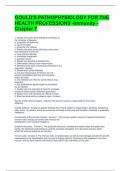
GOULD'S PATHOPHYSIOLOGY FOR THE HEALTH PROFESSIONS -Immunity - Chapter 7
GOULD'S PATHOPHYSIOLOGY FOR THE HEALTH PROFESSIONS -Immunity - Chapter 7 1. Explain how each of the following contributes to the virulence of bacteria: a. production of endotoxin b. spore formation c. presence of a capsule 2. Predict how each of the following could reduce host resistance to infection: a. bone marrow damage b. circulatory impairment c. puncture wound 3. Explain two benefits of resident flora. 4. Differentiate infection from inflammation. 5. Describe three ways o...
- Exam (elaborations)
- • 14 pages •
GOULD'S PATHOPHYSIOLOGY FOR THE HEALTH PROFESSIONS -Immunity - Chapter 7 1. Explain how each of the following contributes to the virulence of bacteria: a. production of endotoxin b. spore formation c. presence of a capsule 2. Predict how each of the following could reduce host resistance to infection: a. bone marrow damage b. circulatory impairment c. puncture wound 3. Explain two benefits of resident flora. 4. Differentiate infection from inflammation. 5. Describe three ways o...
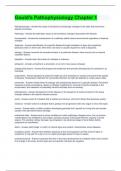
Gould's Pathophysiology Chapter 1 Well Answered Questions Graded A+
Gould's Pathophysiology Chapter 1 Pathophysiology - Answer-the study of functional or physiologic changes in the body that result from disease processes. Pathology - Answer-the laboratory study of cell and tissue changes associated with disease. Homeostasis - Answer-the maintenance of a relatively stable internal environment regardless of external changes. diagnosis - Answer-identification of a specific disease through evaluation of signs and symptoms laboratory tests or other tools...
- Exam (elaborations)
- • 4 pages •
Gould's Pathophysiology Chapter 1 Pathophysiology - Answer-the study of functional or physiologic changes in the body that result from disease processes. Pathology - Answer-the laboratory study of cell and tissue changes associated with disease. Homeostasis - Answer-the maintenance of a relatively stable internal environment regardless of external changes. diagnosis - Answer-identification of a specific disease through evaluation of signs and symptoms laboratory tests or other tools...
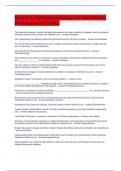
Test Bank Gould's Pathophysiology for the Health Professional Questions and Answers Complete Guide A+
Gould's Pathophysiology for the Health Professional FINAL The potential unwanted, usually damaging outcomes of a primary condition or disease, such as paralysis following recovery from a stroke, are referred to as: - Answer-Sequelae The maintaining of a relatively stable internal environment by the body is called: - Answer-Homeostasis An area of dead cells resulting from a lack of oxygen, where the function of the tissue or organ may be lost, is called a(n): - Answer-Infarction The ...
- Exam (elaborations)
- • 9 pages •
Gould's Pathophysiology for the Health Professional FINAL The potential unwanted, usually damaging outcomes of a primary condition or disease, such as paralysis following recovery from a stroke, are referred to as: - Answer-Sequelae The maintaining of a relatively stable internal environment by the body is called: - Answer-Homeostasis An area of dead cells resulting from a lack of oxygen, where the function of the tissue or organ may be lost, is called a(n): - Answer-Infarction The ...
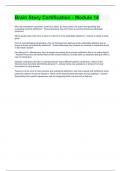
Brain Story Certification - Module 14 Question Well Answered Graded A+
Brain Story Certification - Module 14 Why did mainstream psychiatry continue to reject, for many years, the notion that gambling and overeating could be addictive? - Answer-Because they don't have a prominent physical withdrawal syndrome Which quality does food have to have in order for it to be potentially addictive? - Answer-It needs to taste good From a neurobiological perspective, why are behaviors like eating and sex potentially addictive just as drugs of abuse are potentially add...
- Exam (elaborations)
- • 1 pages •
Brain Story Certification - Module 14 Why did mainstream psychiatry continue to reject, for many years, the notion that gambling and overeating could be addictive? - Answer-Because they don't have a prominent physical withdrawal syndrome Which quality does food have to have in order for it to be potentially addictive? - Answer-It needs to taste good From a neurobiological perspective, why are behaviors like eating and sex potentially addictive just as drugs of abuse are potentially add...
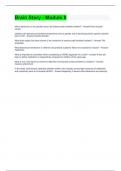
Brain Story - Module 8 Questions Well Answered With 100% Certified Answers
Brain Story - Module 8 Which behaviour is not typically shown by behaviourally inhibited children? - Answer-Poor impulse control. Children with behavioural inhibition temperament are at greater risk of developing which specific disorder later in life? - Answer-Anxiety disorder. What brain region has been shown to be overactive in behaviourally inhibited children? - Answer-The amygdala. What behavioural dimension in children best predicts academic failure and substance misuse? - Answe...
- Exam (elaborations)
- • 1 pages •
Brain Story - Module 8 Which behaviour is not typically shown by behaviourally inhibited children? - Answer-Poor impulse control. Children with behavioural inhibition temperament are at greater risk of developing which specific disorder later in life? - Answer-Anxiety disorder. What brain region has been shown to be overactive in behaviourally inhibited children? - Answer-The amygdala. What behavioural dimension in children best predicts academic failure and substance misuse? - Answe...
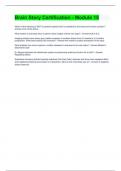
Brain Story Certification - Module 15 Questions and Correct Answers
Brain Story Certification - Module 15 Which of the following is NOT a parental capacity that is mediated by the executive function system? - Answer-none of the above What system is activated when a parent views images of their own baby? - Answer-both A & C Imaging studies have shown grey matter increases in mothers brains from 2-4 weeks to 3-4 months postpartum. What best predicts this increase? - Answer-the mother's positive perception of her baby What predicts how much oxytocin a ...
- Exam (elaborations)
- • 1 pages •
Brain Story Certification - Module 15 Which of the following is NOT a parental capacity that is mediated by the executive function system? - Answer-none of the above What system is activated when a parent views images of their own baby? - Answer-both A & C Imaging studies have shown grey matter increases in mothers brains from 2-4 weeks to 3-4 months postpartum. What best predicts this increase? - Answer-the mother's positive perception of her baby What predicts how much oxytocin a ...
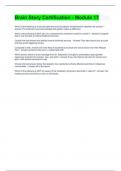
Brain Story Certification - Module 17 Questions and Answers
Brain Story Certification - Module 17 Which of the following is a key principle that should underpin comprehensive treatment for women? - Answer-The treatment must acknowledge that gender makes a difference Which of the following is NOT part of a comprehensive treatment model for women? - Answer-A program that is only focused on clinical treatment services Choose the best answer that defines trauma-informed services. - Answer-They take trauma into account and they avoid triggering traum...
- Exam (elaborations)
- • 1 pages •
Brain Story Certification - Module 17 Which of the following is a key principle that should underpin comprehensive treatment for women? - Answer-The treatment must acknowledge that gender makes a difference Which of the following is NOT part of a comprehensive treatment model for women? - Answer-A program that is only focused on clinical treatment services Choose the best answer that defines trauma-informed services. - Answer-They take trauma into account and they avoid triggering traum...
